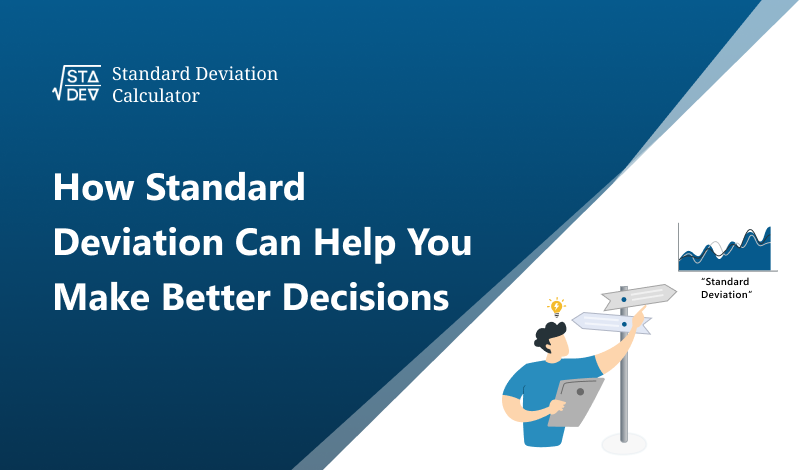How Standard Deviation Can Help You Make Better Decisions

Effective decision-making is critical in all aspects of life, from finance to business, sports, and even personal life. Decisions are influenced by a myriad of factors, and uncertainty often comes into play. This is where understanding statistics, particularly the concept of standard deviation, becomes pivotal.
In this blog post, we delve into how standard deviation can guide us to make more informed and rational decisions.
Understanding Standard Deviation:
Before we delve into the application of standard deviation in decision-making, it's essential to understand what it represents. Standard deviation is a statistical measure that reveals the amount of variation or dispersion in a set of values.
A low standard deviation means that the values are close to the mean (average), while a high standard deviation indicates that the values are spread out over a larger range.
Why is Standard Deviation Important?
Standard deviation can help in evaluating risks and predicting future outcomes, providing invaluable insights for decision-making processes. By indicating the variability within a dataset, standard deviation allows us to assess how likely it is for certain outcomes to occur.
Risk Assessment:
In finance, the standard deviation is often used to quantify the volatility or risk associated with an investment. For instance, a stock with a high standard deviation is more volatile and thus carries more risk. On the other hand, a stock with a low standard deviation is more predictable, offering a safer, albeit possibly lower, return.
Predictive Analysis:
Furthermore, standard deviation aids in predictive analysis. In scientific research, business, or even weather forecasting, it's crucial to predict future trends based on historical data. Standard deviation offers insights into how reliable these predictions are, consequently affecting decision-making.
Business Strategy:
Standard deviation can also assist business leaders in evaluating performance metrics. By calculating the standard deviation of sales, customer feedback, or employee performance, managers can identify if their teams are consistently achieving goals or if there is significant variability.
Using a Standard Deviation Calculator:
A standard deviation calculator is a useful tool to compute standard deviation quickly and accurately. This online calculator simplifies the process, making it easy to perform complex statistical analyses.
Here's how it works:
- Input data: Enter the set of values you wish to analyze into the calculator.
- Calculate: Hit the "calculate" button and watch as the calculator does the number crunching for you.
- Interpret the results: The calculator will display the standard deviation value. A high value indicates a wide dispersion, while a low value suggests a narrow dispersion.
A real-life example of standard deviation:
Let's look at a practical example of how understanding standard deviation can assist in decision-making. Suppose you are a manager at a software company and are comparing the performance of two developers based on the number of lines of code they produce each day.
Developer A's productivity varies significantly day-to-day, while Developer B's productivity is consistent. Even though both developers produce the same average number of lines of code, Developer A's standard deviation will be higher, indicating higher variability.
This knowledge can help you when making decisions about project assignments and deadlines.
In Conclusion: Standard Deviation for Effective Decision Making
Through this understanding of standard deviation, we can recognize it as an indispensable tool for improved decision-making. Whether you're assessing risk, predicting future outcomes, or just trying to understand the variability in a set of data, the standard deviation provides invaluable insights.
With the availability of easy-to-use tools such as the standard deviation calculator, harnessing the power of this statistical measure has never been simpler. So why not make the most of it and improve your decision-making capabilities?
Remember, a more informed decision is always a better decision. And standard deviation is your trusty companion on this journey toward improved decision-making.


